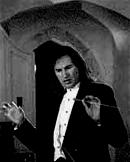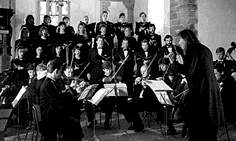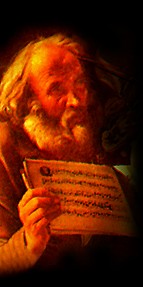 |
 |
 |
 |
 |
|
Graduated from the Tallinn Conservatoire (1976) and completed his postgraduate studies at the Leningrad Conservatoire (1978). He has worked as the conductor of the Estonia Opera and as a lecturer at the Tallinn Conservatoire. In 1981 Tõnu Kaljuste formed the professional Estonian Philharmonic Chamber Choir (EPCC). In 1993 he founded the Tallinn Chamber Orchestra. At present he is the artistic director and principal conductor of both of them, since 1994 he is the principal conductor of the Swedish Radio Choir, and starting from 1998/99 concert season of the Nedherlands Chamber Choir. Tõnu Kaljuste has worked as a guest conductor
with a number of choirs and orchestras in Europe, Australia and North America and as a lecturer at international choral seminars and workshops. He was the artistic director of the Bridges of Song Festival in 1991 and choral festivals Tallinn '88, Tallinn '91 and Vox Est Fest in 1995. For services to Estonia's musical life Tõnu Kaljuste has received the Estonian State Cultural Prize for 1991 and for 1996.
In 1996 he got both the annual award of the Cultural Endowment of Estonia and The Great Bear Culture Prise for Estonian theatre,
music and film art (the last is totally based on private initiative, consists of 21 equal prises to be shared among outstanding doers in cultural life and is started in 1996). Tõnu Kaljuste has set up a number of concert series dedicated to Bach and other Baroque composers. He has conducted operas by Mozart, Britten, Weber and the traditional symphonic repertoire as well as the majority of contemporary Estonian music and most of the compositions by Veljo Tormis, Arvo Pärt and Erkki-Sven Tüür. His recording of Pärt's Te Deum (ECM) was nominated for a Grammy Award in the category of the Best Choral Peformance in 1995.
Estonian choir
It isn't just the sound of music, but "its taste and smell" that allows an audience on one side of the world to connect with a musical tradition from the other side.
 That peculiar sort of sensory immersion, says conductor Tonu Kaljuste, explains how a little choir from Estonia has captured the imagination of music lovers across the United States. And there has to be some explanation for the almost cultlike success of the Estonian Philharmonic Chamber Choir, which stops in Ann Arbor's Hill Auditorium this weekend on its fourth U.S. tour. Kaljuste, who has led the 24-voice ensemble since its post-Soviet reorganization in 1993, says he tries to keep the international celebrity in perspective. Life, he observes in crisp, precise English, is strange. Only a few years ago, his group was just another anonymous Soviet chorus struggling to survive "You could say our reputation is in balance and yet not in balance," the conductor muses. "We have always worked very hard, but now we make recordings and enjoy success."
That peculiar sort of sensory immersion, says conductor Tonu Kaljuste, explains how a little choir from Estonia has captured the imagination of music lovers across the United States. And there has to be some explanation for the almost cultlike success of the Estonian Philharmonic Chamber Choir, which stops in Ann Arbor's Hill Auditorium this weekend on its fourth U.S. tour. Kaljuste, who has led the 24-voice ensemble since its post-Soviet reorganization in 1993, says he tries to keep the international celebrity in perspective. Life, he observes in crisp, precise English, is strange. Only a few years ago, his group was just another anonymous Soviet chorus struggling to survive "You could say our reputation is in balance and yet not in balance," the conductor muses. "We have always worked very hard, but now we make recordings and enjoy success."
The Estonian choir known around the world today is a second incarnation. Under much less worldly circumstances, the original group was an amateur enterprise organized in the early 1960s by an ambitious 24-year-old conductor named Neeme Jarvi. That venture was destined never to soar very high, Kaljuste says, because the government neither provided the group with funds nor permitted much travel. "But now we receive regular support and, of course, we are able to do many more things."
Although Kaljuste never studied formally with Jarvi, he recalls taking every opportunity to watch the celebrated conductor at work. "I attended as many of Jarvi's concerts in Tallinn as possible - and just watched. He always had such excellent basic technique. Very economical and very personal. I never tried to copy him, but he was a big influence on my own conducting."
 The visitors plan two concerts in Ann Arbor. The first, in Hill Auditorium with the Tallinn Chamber Orchestra, will be devoted to music of Mozart and the most famous of Estonian composers, Arvo Part; the second, Saturday night at St. Francis of Assisi Catholic Church, will be an a cappella affair (the only such performance on this tour) in which the choir will appear in Estonian national costumes. When Kaljuste speaks of exposing American audiences to the very taste and smell of music from his homeland, he is talking about the depth of his own study of the Estonian language and its connection to the music. But he is not referring only to the folk tradition. Kaljuste's choir can claim a good measure of credit for the phenomenal popularity of Arvo Part's music in this country. And the benefit has cut both ways. The reclusive Part, whose ethereal music seems to strike the same responsive chord as that of the Polish Henryk Gorecki, has given this choir wings. The Estonians' last tour followed their strong-selling CD of Part's Te Deum, and this trip is pegged to the recent recording of Part's Litany. Kaljuste, sounding a bit like the Rolling Stones' manager, even refers to the current trek as "the Litany tour."
The visitors plan two concerts in Ann Arbor. The first, in Hill Auditorium with the Tallinn Chamber Orchestra, will be devoted to music of Mozart and the most famous of Estonian composers, Arvo Part; the second, Saturday night at St. Francis of Assisi Catholic Church, will be an a cappella affair (the only such performance on this tour) in which the choir will appear in Estonian national costumes. When Kaljuste speaks of exposing American audiences to the very taste and smell of music from his homeland, he is talking about the depth of his own study of the Estonian language and its connection to the music. But he is not referring only to the folk tradition. Kaljuste's choir can claim a good measure of credit for the phenomenal popularity of Arvo Part's music in this country. And the benefit has cut both ways. The reclusive Part, whose ethereal music seems to strike the same responsive chord as that of the Polish Henryk Gorecki, has given this choir wings. The Estonians' last tour followed their strong-selling CD of Part's Te Deum, and this trip is pegged to the recent recording of Part's Litany. Kaljuste, sounding a bit like the Rolling Stones' manager, even refers to the current trek as "the Litany tour."
Strange is post-Soviet life, indeed.
© Lawrence B. Johnson/ Detroit News Music Critic
|
|
|
|

